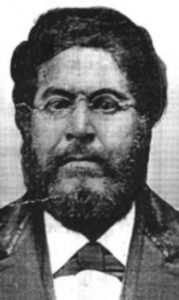
George Boyer Vashon
*George Boyer Vashon was born on this date in 1824. He was a Black educator, lawyer, and abolitionist.
From Carlile, Pennsylvania, he was the son of John Baton Vashon, a Mulatto, and Anne Vashon. George’s father was a well-respected leader in Pittsburgh’s Black community, a businessman, and an abolitionist. Vashon’s father was also instrumental in establishing the first school for Blacks in Pittsburgh. He attended his father's private school until 1837, then a public school where he displayed an aptitude for languages.
At age 16, Vashon could speak Sanskrit, Hebrew, and Persian and was well-versed in Greek and Latin. In 1840, he enrolled in Oberlin Collegiate Institute in Ohio. While at Oberlin, he was a member of Oberlin's prestigious men's literary society, the Union Society. Also, while there, he taught at a Chillicothe, Ohio school.
On August 28, 1844, Vashon became the first Black graduate from Oberlin College, receiving valedictory honors and delivering a commencement address entitled "Liberty of Mind." In his speech, Vashon asserted that "genius, talent, and learning are not withheld by our common Father from people of color". In 1849, Vashon got his Master of Arts degree; after graduation, like his father, he wanted to play a central role in advancing the cause of Black people. He felt that pursuing a career in law could do this.
He studied law under Walter Forward, a judge and prominent figure in Pennsylvania politics. Yet, after Vashon applied for admission to the Allegheny County bar, it was rejected because of his race. He then thought of Haitian emigration as a means of developing his potential. But Vashon took and completed the New York to bar examination on January 10, 1848, thus becoming the first Black to become a lawyer in New York.
In 1849, Vashon moved to Port-au-Prince, Haiti, becoming a Latin, Greek, and English professor. He also was a correspondent for Frederick Douglass's newspaper, "The North Star." In 1851, he moved to Syracuse, New York, and joined the New York Central College faculty in McGrawville. After the Fugitive Slave Act of 1850, Vashon became involved in the Underground Railroad and state and national conventions. These forums brought Blacks together to discuss critical issues confronting their communities and the means of ending the system of slavery.
In 1857, Vashon married Susan Paul Smith, the granddaughter of the Rev. Thomas Paul, Sr. of Boston. The couple had seven children. In 1863, Vashon became the second Black president of Avery College in Pittsburgh. After the American Civil War, Vashon worked in the Solicitor's Office of the Bureau of Refugees, Freedmen, and Abandoned Lands in Washington, D.C. He also became Howard University's first professor and was instrumental in establishing its law school.
When Vashon left Howard, he became a Mathematics and Ancient and Modern Languages professor at Alcorn College in Rodney, Mississippi. His students considered him a good teacher and well-respected by his colleagues. George Vashon was one of its victims when the yellow fever epidemic swept Alcorn's campus in the fall of 1878. He died on October 5, 1878, and is buried on the college's campus.
University of Pittsburgh
Hillman Library
3960 Forbes Avenue
Pittsburgh, PA